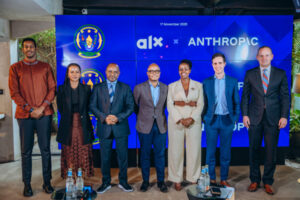ALX, Anthropic and Rwanda Launched a Major AI Education Initiative: Digitizing African’s Learning

In KIGALI, Rwanda, A three-way partnership between ALX, US-based AI company Anthropic, and the Government of Rwanda is set to introduce one of Africa’s most ambitious artificial intelligence education programs to date. The digital tool is called Chidi, an AI-powered learning companion designed to support both students and teachers through inquiry-based, critical-thinking-driven learning. The initiative marks a pivotal moment for African education systems that are rapidly adapting to global technological shifts, alongside families/communities who are increasingly aware that their children’s future competitiveness depends highly on digital literacy. A bid in transforming learning at a progressive scale.
Chidi, built on Anthropic’s Claude model, is unlike the conventional tutoring tools. Chidi guides learners through problem-solving, helping them think more critically and independently as against just simply providing answers. Launched under 48hours, its first UAT-(user acceptance test) has already completed a successful first rollout to ALX learners across the continent, generating over 1100 conversations and 4000 chats. With respect to teachers, the tool promises a different kind of relief. A support with lesson planning, personalized feedback and new ways to engage students. In a region where many classrooms are overcrowded and educators overstretched, Chidi could serve as a vital bridge between aspiration and resources.

Moving forward on a countrywide pilot deployment to filter-through acceptability/challenges. The partnership is now entering a second phase, embedding the technology into Rwanda’s public education ecosystem. Up to 2,000 teachers, along with select civil servants, will complete ALX’s AI Career Essentials program, gaining hands-on skills with generative AI tools.
Educators who complete the program will receive a year of access to Claude’s professional tools, enabling them to apply AI in lesson design, administration and even coding. Government developers will test Claude Code, exploring how AI can support digital governance. A joint working group between ALX, Anthropic and Rwanda government will use learnings from the pilot to shape national AI policy in education, including the potential development of AI tools for schools and feature African-language models.
Why this matters for African families. Across the continent, the initiative represents more than an upgrade in technology. It presents what learning can look like in an era of digitalisation that is in pari passu with global competition. Parents who once viewed digital literacy as an optional, now see AI as essential to their children’s opportunities.
In many African communities, where resources can be uneven and learning quality inconsistent, tools like Chidi promise a measure of educational equity: round-the-clock tutoring, personalized guidance and exposure to the analytical skills needed for the modern workforce. Corridoring an upscale of human intelligent community in a joint procession of cultural/socioeconomic stakes.
The rollout arrives at a time when Africa’s youth population is fastly growing in the world, and becoming a decisive economic factor. If these learners gain competitive AI literacy, Africa could transit from a consumer of global technologies to a producer.
Culturally also, the Chidi project invites Africans to shape how AI evolves on the continent, from language representation to ethical frameworks rooted in local values. Crucially, Rwanda and ALX have emphasised safeguards for privacy and academic integrity, reflecting broader public concerns about the role of AI in classrooms.

Rwanda, known for its tech-forward governance, views the program as aligned with Vision 2050 and the country’s broader digital transformation goals. A political will, meeting private-sector innovation. By investing in teachers and civil servants first, the government shows that a digitally fluent public sector is central to national development.
On the Anthropic’s side, its participation highlights a growing trend among major AI labs to expand beyond Western markets. By covering model and API costs, the company enables large-scale experimentation without passing financial burdens onto the Rwandan government. While ALX, the Africa’s fastest-growing tech talent accelerator, sees the partnership as strengthening its mission to equip young Africans for global opportunities, positioning the African continent as a hub of world-class tech talent. In its successful turnout, Rwanda could become a model for how the low/middle-income countries integrate AI into public education systems. The partners intend to potentially explore the expansion through Rwanda into other African countries.
As Chidi’s acceptability scales, its impact will ripple beyond classrooms, influencing workforce readiness, public-sector innovation, etc., to projecting Africa’s role in the global digital economy. And for young Africans, the future of technological dynamism is already being built here, at their doorsteps.
In the words of Fred Swaniker, Founder/CEO of ALX – “this collaboration marks a bold step in redefining how African talent learns, works and leads in the age of AI. “We are ensuring that Africa’s youth are not just consumers of AI, but creators”.






